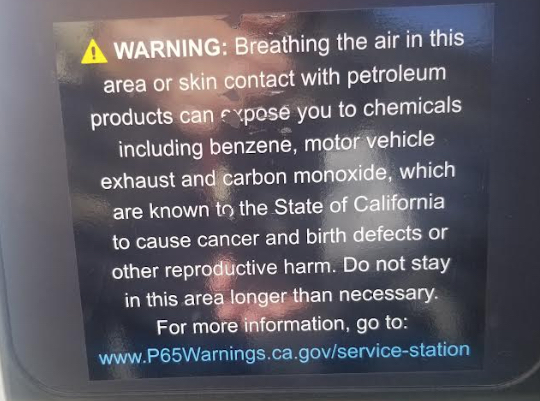A two-year bill (2023/2024)
Existing law, The Safe Drinking Water and Toxic Enforcement Act of 1986 (Prop 65), an initiative measure approved by the voters as Proposition 65 at the November 4, 1986, statewide general election, prohibits a person, in the course of doing business, from knowingly and intentionally exposing any individual to a chemical known to the state to cause cancer or reproductive toxicity without giving a specified warning, or from knowingly discharging or releasing such a chemical into water, or into or onto land and passing into any source of drinking water.
Prop 65 imposes civil penalties upon persons who violate those prohibitions, and provides for the enforcement of those prohibitions by the Attorney General, a district attorney, or specified city attorneys or prosecutors. Prop 65 also provides for enforcement by an action brought by any person in the public interest, if that private action is commenced more than 60 days after the person has given notice of the violation that is the subject of the action to the Attorney General and the district attorney, the city attorney, or the prosecutor in whose jurisdiction the violation is alleged to have occurred, and to the alleged violator.
If the notice made by a person bringing an action in the public interest alleges a violation of Prop 65’s warning requirement, the law requires that the notice include a certificate of merit stating that the person executing the certificate has consulted with one or more persons with relevant and appropriate experience or expertise who has reviewed facts, studies, or other data regarding the exposure to the listed chemical that is the subject of the action, and that, based on that information, the person believes there is a reasonable and meritorious case for the private action.
Prop 65 requires factual information sufficient to establish the basis of the certificate of merit to be attached to the certificate of merit that is served on the Attorney General. Under Prop 65, a trial court may review a certificate of merit’s supporting information to determine if an unsuccessful enforcement action is frivolous, and thus sanctionable.
This bill would explicitly require the information supporting a certificate of merit to include information related to the product that is subject to a notice of alleged violation.
Proposition 65 also provides that it may be amended by a statute, passed by a two-thirds vote of each house of the Legislature, to further its purposes.
This bill would find and declare that it furthers the purposes of Proposition 65.
Full bill text and related information.

